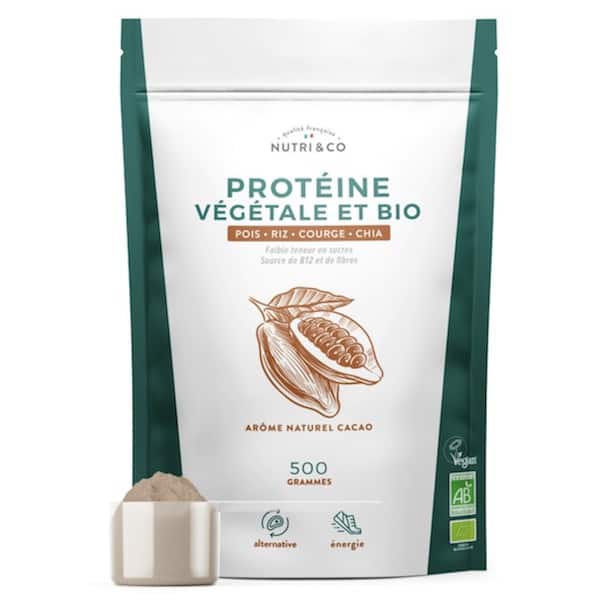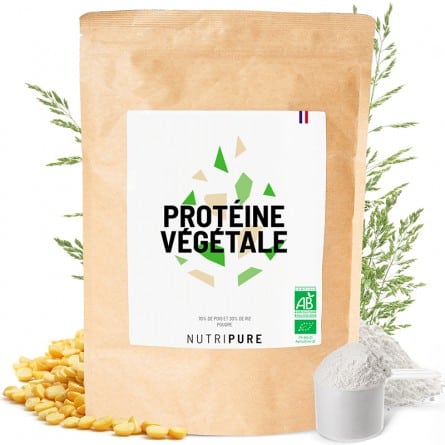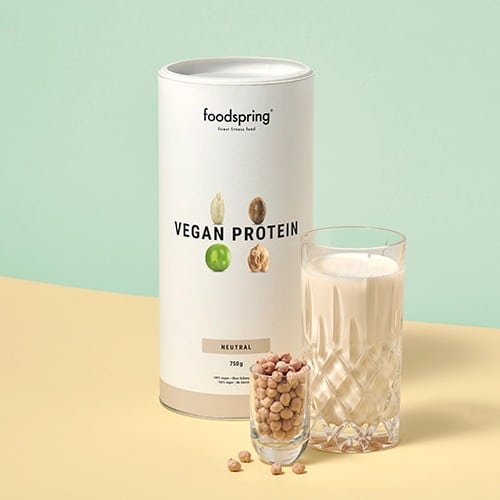For this comparison, we have analyzed and sorted 12 vegan protein brands among the best-selling on the Internet. We have selected only plant-based protein powders meeting the following criteria:
- 100% vegan
- At least 60% protein
- Low in sugar
Best Vegan Protein 🥇
#1
Brand: Nutri&Co
Number of protein sources: 4
Organic: yes
Price / 100 g: 4.98 €
Customer reviews: 4.8/5 (Ekomi)
After analyzing a dozen products, we selected Nutri&Co’s plant protein. It is certified organic and made in France, which is not the case for most products on the market.
This protein powder has an excellent nutritional profile as it combines pea, rice, chia seed, and pumpkin seed proteins. Its amino profile is complete, meaning it contains all 9 essential amino acids.
It is also enriched with naturally sourced vitamin B12 (shiitake) and free from any sweeteners and additives.
We really like this brand because it is reliable and transparent (see our detailed review here). Furthermore, customer reviews are good.
Use promo code DARWINGIFT to receive a free surprise product (minimum purchase of 70€).
Best Alternatives
#2
Brand: Nutripure
Organic: yes
Number of protein sources: 2
Price / kg : 3.29 €
Customer reviews: 4.3/5 (Amazon)
#3
Brand: Foodspring
Organic: no
Number of protein sources: 4
Price / kg : 4 €
Customer reviews: 4.5/5 (Trustpilot)
What are the benefits of plant proteins?
A source of amino acids
Plant proteins are composed of amino acids. We distinguish between non-essential amino acids, which are produced by the body itself, and essential amino acids provided through diet.
They are involved in a large number of metabolic processes: hormone and neurotransmitter production, immune system…
The quantity and type of amino acids provided vary depending on the plant proteins consumed. Some have lower content than animal proteins.
But good combinations allow for a balanced diet and a broad spectrum of amino acids.
Finally, plant proteins play a role in disease prevention. As shown by this study, they help reduce the risk of chronic diseases such as diabetes and heart disease.
Rich in unsaturated fatty acids, they also contain antioxidants (vitamin C, carotenoids, and polyphenols) and present no cholesterol.
Ideal for athletes and bodybuilding

In the context of sports practice, plant proteins contribute to muscle building, maintenance, and tissue repair.
A true “fuel” for the body, they provide energy and improve endurance.
They can also help with gaining muscle mass and weight control. Their consumption is beneficial, regardless of the sports field: bodybuilding, fitness, weightlifting…
Where to buy plant proteins?
Organic stores
Legumes, cereals, dried fruits, and tofu are excellent sources of plant-based proteins and are often available in organic stores.
You can also find plant-based protein powders or superfoods like spirulina or moringa.
Pharmacies and Parapharmacies
Pharmacies and parapharmacies may offer protein powder blends. These are mainly aimed at vegetarians, vegans, and athletes.
Specialized Physical Stores
Turn to dietary supplement retailers and health food stores.
Specialized Online Shops and E-commerce
Favor shops and websites offering organic products like Naturalia, Kazidomi, or La Fourche. Some labs, like Nutripure, offer organic, vegan, and gluten-free plant proteins.
In What Form?
Powdered

Powder is generally well concentrated and allows for good absorption of proteins by the body. Convenient and easy to take, it can be sprinkled on dishes or used to make protein drinks (smoothies, shakes…).
It can have a neutral or flavored taste. It can be consumed for breakfast, before and/or after a workout.
Different sources of plant-based proteins are used to make it. The most common are:
- pea protein: it has a good amount of amino acids and helps with weight control. It is well-digested and highly bioavailable;
- soy protein: a complete protein that contains all essential amino acids. Very good digestibility;
- rice protein: it contains 80 to 90% protein and has high digestibility;
- hemp protein: rich in tyrosine and arginine, ideal for maintaining and developing muscle mass. Excellent digestibility.
Barred
There are protein bars made from plant-based proteins (rice, pea, soy…) and dried fruits (nuts, dates…). They make an excellent snack for athletes.
They can also be raw, gluten-free for celiacs, and/or with no added sugar.
Various Preparations
There are many preparations to supplement with plant-based proteins. You can opt, for example, for protein-enriched bread or spreads.
Some brands also offer ready-to-use protein recipes: pancakes, brownies…
Plant-Based Proteins and Whey: What’s the Difference?
Whey is popular among athletes due to its quick assimilation, digestibility, and richness in essential amino acids. It’s a whey protein derived from cow’s milk.
It is therefore not vegan. In this sense, plant-based protein powder is an interesting alternative as it contains no animal-derived products.
READ ALSO A dietitian’s advice on buying the best whey
What Criteria Should Be Considered?

1. Nutritional Value
The powder must contain at least 60% plant-based proteins. It should contain all essential amino acids in balanced proportions. Check the total BCAA, which corresponds to the amount of leucine/isoleucine/valine per 100 g. The total EAA indicates the quantity of essential amino acids per 100 g.
Ideally, choose a powder high in fiber and low in sugar. Some are enriched with vitamins and minerals: B6, B12, calcium, zinc…
2. Mode of Cultivation
Opt for plant-based proteins from organic farming. This ensures that you buy a product free from pesticide residues and GMOs.
3. Composition
The composition must be natural, without additives, preservatives, sweeteners, or colorants. Choose a vegan powder, free from lactose and/or gluten. For flavored powders, opt for natural flavors.
4. Bioavailability
The more bioavailable a plant-based protein is, the better it will be absorbed and used by the body. The product must therefore guarantee you excellent bioavailability.
5. Digestive Assimilation
This corresponds to the amount absorbed by the intestine compared to the total amount ingested. The PDCAAS (Protein Digestibility Corrected Amino Acid Score) is an index that evaluates protein digestibility.
It ranges from 0 (the lowest quality) to 1 (the highest quality).
6. Origin
Plant-based proteins should come from France or the European Union. This generally guarantees good cultivation conditions. Avoid products whose origin is unclear or from China.
7. Price
Expect to pay between 15 and 30€ for 500 g of plant-based protein powder.
An organic protein bar costs around 2€.
To Sum Up
To purchase quality plant-based proteins, verify:
- The nutritional value: the product must contain a minimum of 60% plant-based proteins. It should offer an ideal profile of amino acids, vitamins, and minerals;
- The cultivation method: choose an organic product, without pesticides or GMOs;
- The composition: favor a composition without additives, sweeteners, colorants, and preservatives. The powder should be natural, ideally lactose-free, gluten-free, and vegan;
- Bioavailability: it must be excellent for good absorption of proteins by the body;
- Digestive assimilation: the PDCAAS should be 1;
- Origin: they should come from France or the European Union;
- Price: it should be between 15 and 30€ for 500 g of plant-based protein powder. Count around 2€ for an organic protein bar.
Best Vegan Protein
#1
Brand: Nutri&Co
Number of protein sources: 4
Organic: yes
Price / 100 g: 4.98 €
Customer reviews: 4.8/5 (Ekomi)
When you purchase the selected products, a commission may be paid to us to keep the site running, remunerate our writers, and guarantee you quality information. This does not affect the prices.






